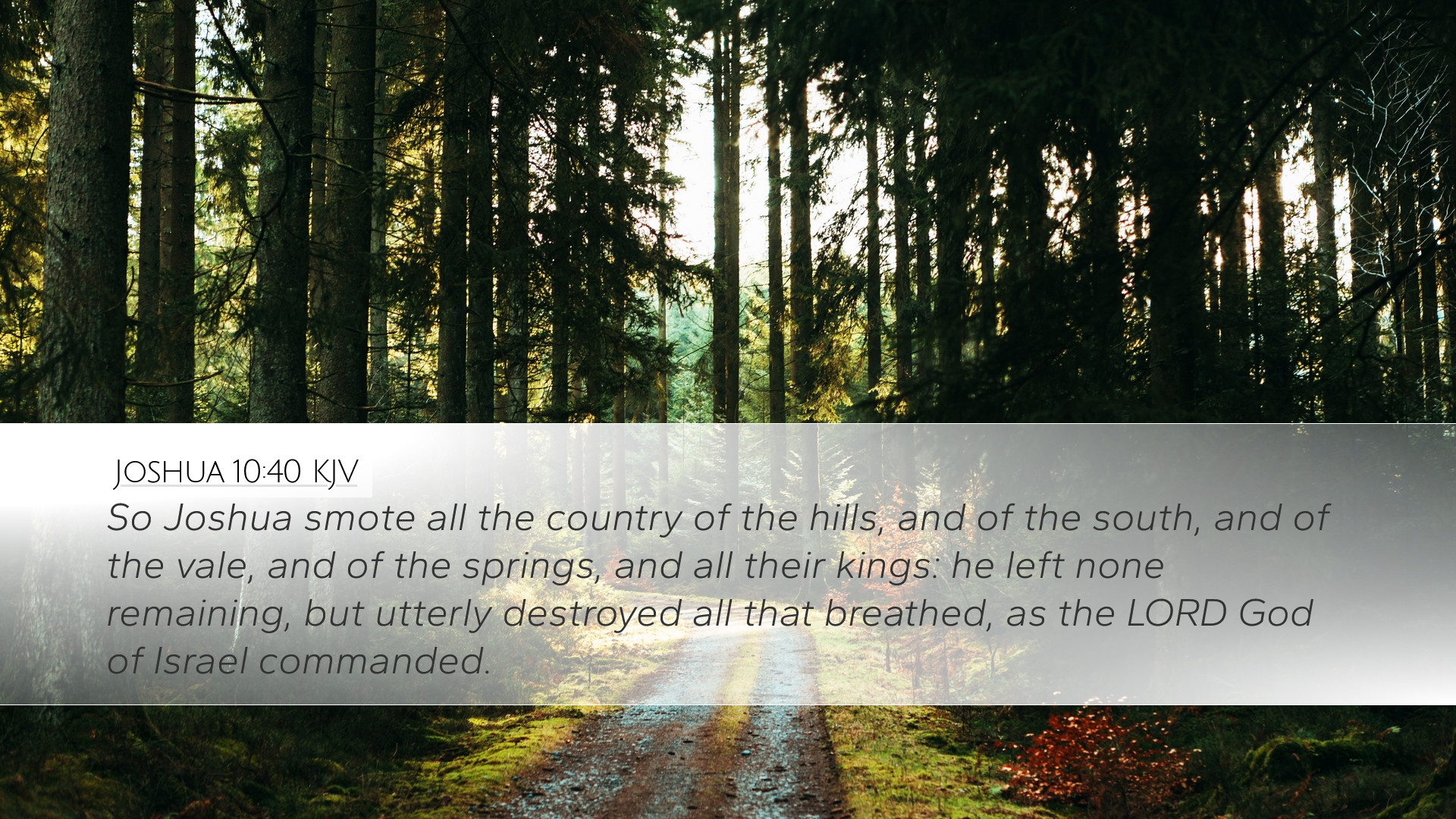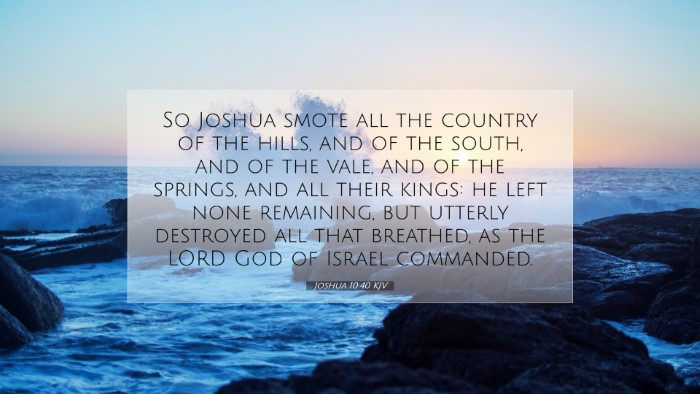Bible Commentary on Joshua 10:40
Verse Text: "So Joshua conquered all the land, the hill country and the Negev and the lowland and the slopes, and all their kings; he left no survivor, but he devoted to destruction all that breathed, just as the Lord God of Israel commanded." (Joshua 10:40, ESV)
Introduction
This verse serves as a critical summary of Joshua's military campaigns in Canaan, emphasizing the completeness of the conquest and the theological significance behind it. Notable commentaries from scholars such as Matthew Henry, Albert Barnes, and Adam Clarke provide various insights to enhance our understanding.
The Context of Conquest
The conquest of Canaan is filled with profound lessons about obedience, divine judgment, and the fulfillment of God's promises:
- Historical Setting: The Israelites, having wandered for 40 years in the wilderness, are now poised to take the land promised to their forefathers.
- Military Strategy: Joshua’s campaigns illustrate the importance of strategic planning and divine guidance in achieving victory over seemingly insurmountable odds.
- Theological Significance: The destruction of Canaanite cities and peoples highlights God’s judgment against sin, underlining the necessity of purity for His chosen people.
Insights from Commentators
Matthew Henry's Commentary
Henry emphasizes the totality of Joshua's conquests. He notes that the phrase “left no survivor” underlines the seriousness of God’s command and the severity of His judgment against the Canaanites. Joshua’s actions fulfill God’s covenant promise and indicate that God’s will is paramount, even when it demands harsh measures.
Albert Barnes' Notes
Barnes draws attention to the geographical references in this verse, pointing out that the descriptions of the 'hill country,' 'Negev,' and 'lowland' illustrate the expansiveness of the victory. He notes that Joshua’s conquests extend beyond just military triumph— they establish Israel as a nation firmly rooted in the land. Barnes underscores the importance of obedience to God's commandments, as it determined the success of Joshua’s campaigns.
Adam Clarke's Commentary
Clarke provides a historical perspective, discussing the significance of the phrase “devoted to destruction” (herem). He emphasizes that this was not mere brutality, but a spiritual mandate to cleanse the land of idol worship and sinfulness. Clarke also points to the symbolic nature of these conquests, suggesting that they represent the spiritual battles believers must fight today against sin and corruption.
Theological Implications
The events of Joshua 10:40 resonate with various theological themes:
- Divine Sovereignty: The utter defeat of Israel’s enemies reaffirms God’s sovereignty in orchestrating history according to His will.
- Judgment and Mercy: God’s judgment on the Canaanites serves as both a warning and an exploration of justice; highlighting that God has patience but ultimately will bring judgment for sin.
- Covenant Fulfillment: These conquests are integral to the covenantic promise made to Abraham, Isaac, and Jacob, illustrating that God fulfills His promises even through human agency.
Practical Applications
For pastors, theologians, and students, Joshua 10:40 presents several applications:
- Commitment to God’s Commands: Believers today must approach their spiritual lives with the same diligence and commitment that Joshua showed, recognizing the importance of obeying God’s Word in all aspects of life.
- Engagement in Spiritual Warfare: The narrative encourages Christians to engage boldly in spiritual battles, knowing that God is with them as He was with Joshua.
- Understanding Judgment: The gravity of divine judgment should prompt contemporary reflection on the nature of sin and the importance of repentance.
- Hope in God’s Promises: Just as Joshua's leadership led to Israel’s inheritance of the Promised Land, believers can rest assured in God’s promises for spiritual inheritance and eternal life through Christ.
Conclusion
Joshua 10:40 encapsulates a pivotal moment in the history of Israel and provides rich insights into God's character, His requirements from His people, and the ever-relevant themes of judgment, obedience, and covenant fidelity. As believers meditate on this verse, they are invited to consider its implications for their own faith journey, encouraging a deeper reliance on God’s guidance in every endeavor.


